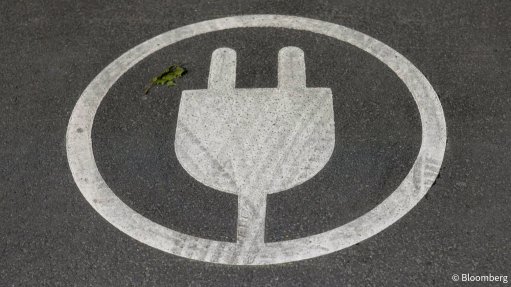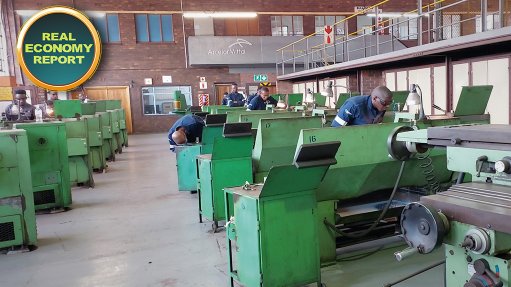ESG: Social impact is the true measure
This article has been supplied as a media statement and is not written by Creamer Media. It may be available only for a limited time on this website.
By: Carmel Kistasamy, Head: Global Development Organisations, Pan-Africa
“Businesses must reconnect company success with social progress. Shared value is not social responsibility, philanthropy, or even sustainability, but a new way to achieve economic success. It is not on the margin of what companies do but at the centre. We believe that it can give rise to the next major transformation of business thinking.”
This quote from American author and academic Michael Porter has been a guiding principle for much of the work we as a bank have done as we have embraced the world of Environmental, Social and Governance (ESG) principles throughout our business.
If we look back, the term “ESG” emerged in 2005 where ESG principles found its roots as part of a study entitled “Who Cares Wins” conducted with private and public sector experts in conjunction with asset managers, bankers and analysts where bottom-line profits at all costs were reviewed against long-term sustainability metrics and business goals.
The terms “stability” and “predictability” are particularly pertinent and underlines the importance of measuring the Business Value and impact of the “Social” aspect of the ESG equation.
Writing for the World Economic Forum (WEF) Sonja Haut, the Head of Impact Valuation at Novartis notes: “Impact valuation involves quantifying and valuing a company's positive and negative externalities related to society and the environment.”
As ESG has taken hold, there has been a big focus on the Environmental side of the matrix, most notably in areas like green and renewable energy. Whilst still a continuous journey, there are now clearer structures and processes when it comes to responsible lending in this space.
The “Social” side is more nuanced, and, in many cases, it has been relegated to citizenship and feel-good initiatives rather than a broader understanding of social impact. It is important that we don’t confuse this with charity and donations – but rather long-term corporate sustainability.
We cannot relegate the “S” in ESG to citizenship – it must be a complete solution that builds toward long-term sustainability. Investors want to invest in regions which are stable, predictable, and offering investment returns.
By understanding how to measure the business returns of social impact, leaders can translate social value into the language of business and demonstrate the value of social impact work to make sure that it is appropriately included in strategic and resource allocation decisions.
The 2020 Deloitte Review article Measuring the business value of corporate social impact: Beyond social value to enterprise performance, suggests measuring the business value of corporate social impact against six drivers and matching it to existing business metrics to measure the business value of social impact in ways that are comparable and consistent with other corporate considerations. The six drivers identified includes: brand differentiation, talent attraction and retention, innovation, operational efficiency, risk mitigation and capital access and market valuation.
By using this approach, Deloitte found that corporations can identify concrete measures around both the social and business value of each of the six drivers. These measures can be used to develop a corporate social impact scorecard that can facilitate key decisions about when and how to integrate social purpose into core business activities across the business.
ESG forms a core part of the Absa value proposition, and the bank has invested significant financial and human capital in this space. But before we can take solutions to market, we need to ensure that we are not just talking a good game but actively living the solutions we are putting to clients. As a Bank we are strongly positioned in terms of the “E” with a clear strategy and structure in place.
We have focused on overcoming the notion that the “S” is more of an individual project at an employee level or citizenship events - there is an imperative to bring our participation as a Bank in the aspects related to Social, to the forefront of how we do business. This encompasses Financial Inclusion, Supply Chain and SME support, Gender Equality Financing, and Youth Empowerment.
To that end, we are encouraged by the adoption both internally and externally of true ESG principles that are focused on developing solutions which will benefit the African continent immeasurably in the next 10 to 15 years.
We have built some exciting initiatives and over the last 5 years have invested over R1.5bn via our Group Society Investment which has benefited over 860 000 beneficiaries – particularly youth who are looking to develop professional skills and start their own small businesses.
We worked on several landmark projects in the fields of green bonds, social impact bonds, healthcare and education. The pharmaceutical and healthcare sectors have been particularly proactive in developing solutions with many of our multinational clients driving initiatives in digital healthcare, testing, women-empowerment, and access to education.
This concept of value-chain-banking is starting to resonate with clients who can coordinate efforts throughout their stakeholder base to ensure maximum impact. A big part of our success here is because we have been able to educate our internal stakeholders throughout the bank and have them develop integrated solutions for clients at multiple levels in their operations.
We believe that the right partnerships are key to unlocking Africa’s ESG investment potential but more than that to use the right drivers and measures to manage impact investment to ensure we facilitate connecting company success with social progress. Together we can make impact valuation the new normal and accentuate the “S” in the ESG equation in ways that make business sense.
Comments
Press Office
Announcements
What's On
Subscribe to improve your user experience...
Option 1 (equivalent of R125 a month):
Receive a weekly copy of Creamer Media's Engineering News & Mining Weekly magazine
(print copy for those in South Africa and e-magazine for those outside of South Africa)
Receive daily email newsletters
Access to full search results
Access archive of magazine back copies
Access to Projects in Progress
Access to ONE Research Report of your choice in PDF format
Option 2 (equivalent of R375 a month):
All benefits from Option 1
PLUS
Access to Creamer Media's Research Channel Africa for ALL Research Reports, in PDF format, on various industrial and mining sectors
including Electricity; Water; Energy Transition; Hydrogen; Roads, Rail and Ports; Coal; Gold; Platinum; Battery Metals; etc.
Already a subscriber?
Forgotten your password?
Receive weekly copy of Creamer Media's Engineering News & Mining Weekly magazine (print copy for those in South Africa and e-magazine for those outside of South Africa)
➕
Recieve daily email newsletters
➕
Access to full search results
➕
Access archive of magazine back copies
➕
Access to Projects in Progress
➕
Access to ONE Research Report of your choice in PDF format
RESEARCH CHANNEL AFRICA
R4500 (equivalent of R375 a month)
SUBSCRIBEAll benefits from Option 1
➕
Access to Creamer Media's Research Channel Africa for ALL Research Reports on various industrial and mining sectors, in PDF format, including on:
Electricity
➕
Water
➕
Energy Transition
➕
Hydrogen
➕
Roads, Rail and Ports
➕
Coal
➕
Gold
➕
Platinum
➕
Battery Metals
➕
etc.
Receive all benefits from Option 1 or Option 2 delivered to numerous people at your company
➕
Multiple User names and Passwords for simultaneous log-ins
➕
Intranet integration access to all in your organisation


















